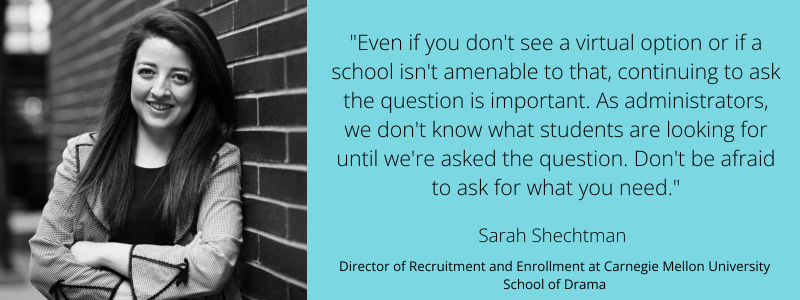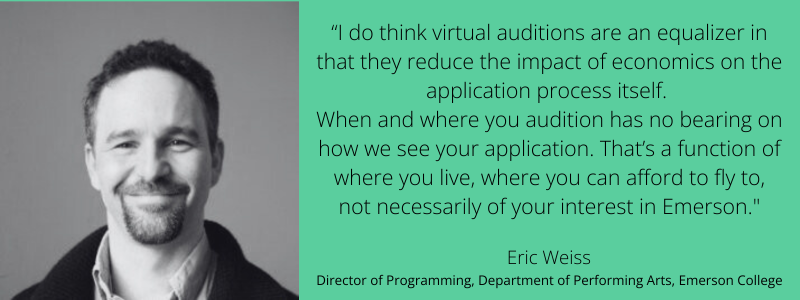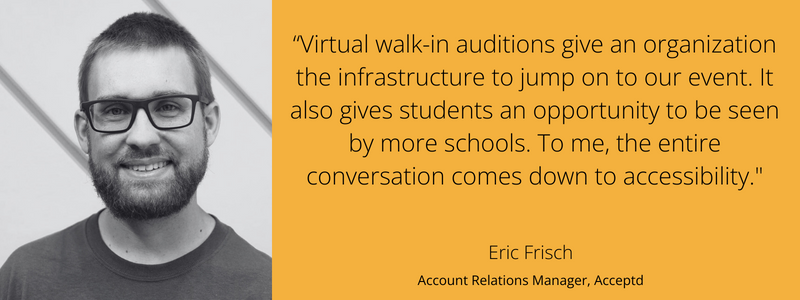As a child from a lower-middle-class family in the Midwest, we didn't travel often or have a chance to see Broadway shows. I didn’t study musical theatre because I was worried that I didn’t have enough dance training to audition. My family also didn’t have the means to pay for college without scholarship opportunities. I assumed very early on that certain doors were closed to me, and I wouldn’t have made it to Broadway if people hadn’t welcomed me into their world. Now, thanks to the virtual world and many people who are challenging themselves to provide accessibility and equity, more students will have greater access to those possibilities. Here are some of the ways the college audition world is changing, and some tips from those change-makers:
.png)
Musical Theatre Common Prescreen
Any university or training program can participate in the Musical Theatre Common Prescreen (MTCP). The MTCP’s goal is to streamline the requirements for college auditions so students can apply to more programs with fewer requirements to check off the list.
Students can access a full list of participating institutions HERE and download a copy of the requirements for those schools. Each school provides a more detailed list of their requirements on their websites or Acceptd Landing Page so students can be sure they are meeting those requirements.
The MTCP guidelines are made by a committee of musical theatre programs who meet several times each year to promote inclusive language, requirements, and options for students worldwide.
Virtual Auditions
Though the pandemic made these auditions a necessity, most programs are now offering virtual audition options. Two schools who are offering a variety of virtual options are Carnegie Mellon University and Emerson College. Here is what Sarah Shechtman (Director of Recruitment and Enrollment at Carnegie Mellon University School of Drama) and Eric Weiss (Director of Programming, Department of Performing Arts, Emerson College) had to say about virtual audition options:

Acceptd: How many virtual options do you have?
E.W.: For every Boston audition, we offer a virtual option too.
S.S.: All of our Design and Production interviews are virtual [design, production, directing, dramaturgy]. And for the performers (Acting and MT), we have a week of virtual auditions where we do the same process that we do for live auditions. You first submit your prescreen and if you're invited for a live audition, you’ll audition live through GetAcceptd’s Audition Room.
Acceptd: How have virtual auditions impacted your audition process?
E.W.: Our early action auditions were historically in Boston. Some students didn’t realize that if they applied early action they would have to fly to Boston. So, a good percentage of people who applied early action didn’t complete early action and wound up as regular applicants. One of the big things that surprised us with the virtual auditions is how many people are actually now able to complete it. We tripled the number of people we could consider for early action.
S.S.: It doesn’t impact negatively at all. In fact, it has only increased access. It hasn't necessarily changed when students audition since we don’t have Early Access for Acting and MT, and all of our auditions happen in January and February.

Acceptd: Do you more strongly consider students who audition in-person?
S.S.: No, there were definitely students who auditioned virtually and in person who were admitted. It's fair game.
E.W.: When and where you audition has no bearing on how we see your application. That’s a function of where you live, where you can afford to fly to, not necessarily of your interest in Emerson.
Acceptd: Do you have any tips for students who are auditioning virtually?
S.S.: Sometimes when there is a camera in front of us, I think that students can tend to use the camera as being on screen or on stage. Pretending that the camera is a second adjudicator is helpful because then you don't worry about "being on camera." You're more likely to talk to the camera as if it were just another person.
E.W.: Be yourself, try to pick material that you think helps us see you. We’re not casting a show; we’re not hiring designers. We’re looking for students who are going to live here for four years, and that’s a very different objective. If you can show up and be an open, creative, passionate, grounded student, that’s what’s appealing - not the perfection of your monologue.
Acceptd: Has a virtual audition component made your process easier or more difficult?
E.W.: Easier. I get far fewer phone calls that say, ‘You’re booked in Chicago- I can only get to Chicago.’
S.S.: I think it has made it easier because we're basically opening up more offerings to students. It makes their process easier, which makes our process easier.
Acceptd: What are your hopes for accessibility and equity in the college audition process in the future?
E.W.: I do think virtual auditions are an equalizer in that they reduce the impact of economics on the application process itself. I think the more equity that we can create, the better. I think the Common Prescreen is another step in the right direction. I would like to see us all do a better job of considering culture as a part of someone’s background, in terms of what they can do or not do, or our expectations of them…. I think we constantly need to be asking those questions.
S.S. I hope that more things emerge like the Common Prescreen, which makes auditions accessible and easier for the students and the parents. This process is really hard and anything to make students and parents able to go through this process without worrying about missing a detail or a requirement is my personal dream.
I know CMU will always maintain our virtual options. My hope is that the virtual options, whether it be auditions or visits or coachings will continue.
AuditionRoom and Virtual "Walk-In" Auditions
Since 2020, Acceptd has offered AuditionRoom, a “Live, virtual, real time audition product." Account Relations Manager, Eric Frisch said, “They [Institutions] are able to take advantage of all of the features Acceptd offers - scheduling, day of tools to keep track of applicants, and adjudication tools, which provide a seamless experience for both the organization and the applicant.”

Acceptd also hosts a "Virtual Walk-In" Weekend” of auditions for any institution, which is a great option for schools who don't use AuditionRoom or who can't attend in person Unified auditions. Frisch said, “Virtual walk-in auditions give an organization the infrastructure to jump on to our event. It also gives students an opportunity to be seen by more schools. To me, the entire conversation comes down to accessibility."
If you are at an institution that is trying to figure out where virtual auditions fit into your long-term strategy, Frisch only sees a benefit, "The accessibility provided by virtual options is huge because it gives more opportunities for applicants and broadens applicant pools for schools. For me, the whole point is to find the right opportunity for the artist to make them succeed."
If you are a student looking for more audition opportunities, Sarah Shechtman says, don't be afraid to ask! "Even if you don't see a virtual option or if a school isn't amenable to that, continuing to ask the question is important. As administrators, we don't know what students are looking for until we're asked the question. Don't be afraid to ask for what you need."
About the author: Erica Spyres is an actor, singer, and violinist living in NYC. She has appeared on Broadway in Tony Award winning musicals - Paradise Square, Carousel, the First National Tour of Once, as well as the Parisian premiere of Passion. She coaches for My College Audition and is part of the Marketing Services team at Acceptd.


